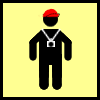joanna71985 wrote:I've never really noticed myself having an accent.
That's probably because you speak the dominant dialect. That doesn't mean your speech is accentless; it just means that the features of your dialect are shared by the majority of American English speakers. You'd have a very strong accent to, say, a native of London, or a speaker of Indian English.
I'm using "dialect" in a technical linguistic sense; it means the specific form of a language used by a speech community.
Everyone has a dialect. Mine is northern Californian, and sounds a lot like Standard American, although there are some subtle differences. To answer a question upthread about Californian accents, the Rs are a little harder, some of us say "rilly" for "really," and California is where the emphasizer "hella" originated. Our vowels are sometimes a little different, too - broader and more flattened. Older San Franciscans say the days of the week as "Mondee" and "Tuesdee," but it's slight and not very exaggerated.
If you want a technical discussion of the different vowel sounds throughout the United States, check out
http://www.ling.upenn.edu/phono_atlas/N ... alMap.html, which outlines the results of a 1996 linguistics study.
Regional differences in the US aren't as pronounced as the ones in England, but they do exist. One reason is that we just haven't been around as long, but the second and IMO more influential one is the advent of transportation and communication technologies. People migrated across great areas in a relatively short amount of time, which meant there simply wasn't time for distinctive regional dialects to develop. This is why you encounter less diversity as you move West; the east coast settlements are older, so there's more variation there.





